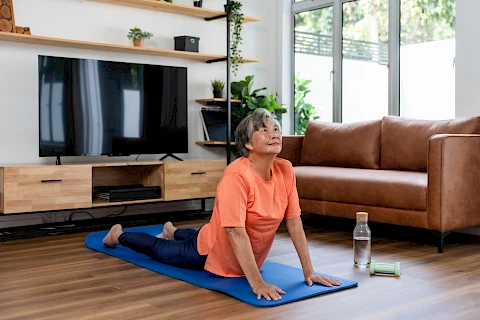
October 12th marks World Arthritis Day. It’s a day dedicated to raising awareness about arthritis. The condition affects millions of people worldwide and is prevalent among seniors. From gentle exercises to lifestyle changes, managing senior arthritis requires finding what works for you so you can stay active and maintain independence despite the symptoms.
What Is Arthritis?
Arthritis is not just a single disease. It encompasses more than 100 different conditions that affect the joints. The two most common types are osteoarthritis and rheumatoid arthritis. Osteoarthritis occurs when the cartilage between joints wears down over time, causing bones to rub against each other. This leads to pain, swelling, and reduced movement.
Rheumatoid arthritis, on the other hand, is an autoimmune condition where the body's immune system mistakenly attacks the joints. Common symptoms include pain and stiffness in joints, swelling in affected areas, reduced mobility, and feeling fatigued. These symptoms can significantly impact daily life, making simple tasks difficult and painful.
Managing Pain and Stiffness
Several effective strategies can ease the pain and stiffness caused by arthritis. Various medications can relieve pain and reduce inflammation. Over-the-counter options like ibuprofen or acetaminophen can offer relief for mild discomfort. For more persistent or severe pain, your doctor may recommend prescription medications such as corticosteroids or disease-modifying antirheumatic drugs (DMARDs). Medications can cause side effects, so always consult a healthcare provider for the best options.
Physical therapy is also an excellent option. Therapists can guide you through exercises tailored to strengthen muscles around the joints and improve flexibility. Routine check-ups are vital for managing arthritis. Regular visits to a healthcare provider can help monitor the condition to determine the need for adjustments to the treatment plans. Early intervention can prevent symptoms from worsening, making it easier to manage the condition long-term.
Lifestyle Modifications for Better Joint Health
A balanced diet rich in anti-inflammatory foods can be beneficial in managing arthritis symptoms. Foods high in omega-3 fatty acids, such as fish, nuts, and seeds, can reduce inflammation. Consuming plenty of fruits and vegetables and limiting processed foods and sugars can also make a difference.
Maintaining a healthy weight is beneficial for mobility, as carrying extra weight puts additional stress on the joints, especially the knees, hips, and back. Regular exercise combined with a healthy diet can achieve this goal. Low-impact activities like walking or swimming are excellent for those with arthritis. These exercises maintain joint function without exerting too much pressure on the joints. Activities like yoga and tai chi can also be beneficial as they incorporate gentle movements and improve flexibility. Remember to consult a doctor before starting a new fitness routine.
Senior Helpers Provides In-Home Care for Seniors With Arthritis and More
Effective management of arthritis involves a combination of medication, physical therapy, regular check-ups, and lifestyle changes. Having the right support when dealing with a lifelong medical concern can make all the difference. Senior Helpers Appleton provides exceptional in-home care for seniors with chronic conditions. Serving Appleton, Menasha, Neenah, Oshkosh, and the surrounding Fox Cities, we offer personalized care plans for seniors with arthritis to manage pain and improve their quality of life. Contact us today for more information!